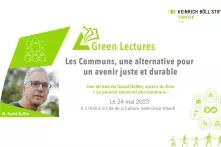Web Dossier
The Commons
A key economic concept for sustainable development
The world we have inherited no longer works. It is enough that the future of the planet and civilisation as we know it is under threat. And yet, countless commons, experimental projects and committed social movements are opening up important avenues for the future.
We need to imagine new and better ways of being, doing and knowing. To do this, we must first recognise and move beyond narratives of capitalist progress and state power. Today, in the face of climate change, species extinction, economic inequality, authoritarian repression, racial and gender discrimination, among many other ills, we must confront the structural problems of the market/state system.
Capitalism has captured and corrupted our democratic processes. State bureaucracies and transnational markets are often unable to solve many problems. They are too big, too powerful and too remote. Too complex and legalistic. Too eager to transfer responsibility and risk. For too long we have relied on centralised, hierarchical and unaccountable institutions that disempower us.
Could we imagine a post-capitalist way forward?
What are the Commons?
Commoning is a set of ongoing practices. It is a way of managing a resource like traditions, knowledge or natural resources for the benefit of all through a clearly defined community that agrees on a common set of rules.
History of the Commons in Tunisia
"Commoning" in Tunisia
Free, Fair, and Alive: The Insurgent Power of the Commons
We are delighted to present to you the book "Free, Fair and Alive," an inspiring work that explores the potential of the Commons to transform our society. Co-authored by David Bollier and Silke Helfrich, this book provides a thorough and engaging analysis of how the Commons can reshape our economic, social, and environmental systems. It examines how collaboration, sharing, and democratic governance of resources can lead to a more equitable and sustainable society.
To learn more about this exciting topic, we invite you to check out the link above and the two interview segments featuring Silke Helfrich and David Bollier.
Capsule d'Interview : Exploration des Communs avec Silke Helfrich & David Bollier - hbs Tunis
 Watch on YouTube
Watch on YouTube
Réinventer le Langage des Communs | Session Créative avec Silke Helfrich & David Bollier - hbs Tunis
 Watch on YouTube
Watch on YouTube







